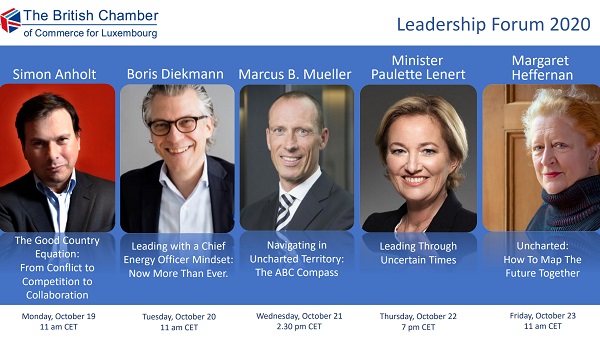
The British Chamber of Commerce (BCC) for Luxembourg held its annual Leadership Forum online last week, from 19-23 October 2020.
The BCC's flagship Leadership Forum, entitled this year "Beyond Here Be Dragons: Charting Unknown Waters", was held completely online, with a one-hour event every day of the week instead of the usual two-hour evening gathering. Over 350 attendees tuned in over the course of the week.
The week began with Simon Anholt, an author and TED speaker, who explained the need for countries to do good if they wanted their image to improve. He announced that Luxembourg had risen to number 11 on the Good Country Index, a list of around 150 countries ranked in order of the good and least harm they do in the world. He also shared his view that there are three stages of human evolution: survival, competition (which we are in) and collaboration, which he wanted us to aspire to.
On Tuesday, Boris Diekmann, author of Chief Energy Officer and international leadership coach, led an interactive session on the link between human energy levels and emotions. In these challenging times, leaders can positively or negatively affect others depending on how they used their energy. He concluded that leading with positive energy and an open state of heart was a wise way to lead in times of uncertainty.
On Wednesday, Marcus Mueller, a Professor at Sacred Heart University Luxembourg, gave an interactive session on how organisations can use a new tool to drive engagement, increase energy and improve communication amongst other things. Three scientifically proven key “vitamins” - autonomy (A), belonging (B) and competence (C) - determine how people feel and behave towards others. Using this framework and language enables organisations and leaders to have important conversations to ensure that employees’ basic psychological needs are respected.
Thursday was a change in format as Luxembourg's Minister of Health Paulette Lenert was asked to share her experience of actually leading through this COVID-19 crisis. Many people in the audience commented on how refreshing it was to hear a leader who did not try to appear perfect. The Health Minister acknowledged that there were many lessons learned and continue to be learned as she and her team navigate this health crisis. In particular, preparations would be changed for future pandemics in terms of supplies needed, just in case.
Which leads into the topic of the final speaker, Margaret Heffernan, author of Uncharted: How to map the Future, which inspired the topic of the forum. She echoed Simon Anholt’s call for collaboration and outlined the danger of efficiency when tackling complex problems. Not having enough masks in an epidemic is an example of where efficiency needs replacing with "just in case" thinking. She called for more experimentation in a crisis, greater use of scenario planning and explained the uselessness of five-year plans when even expert forecasters can only look 400 days into the future.
Overall, this was a different, thought-provoking and relevant leadership event which captured the mood of the times, gave participants tools for dealing with “dragons” and gives participants some cause for hope.








